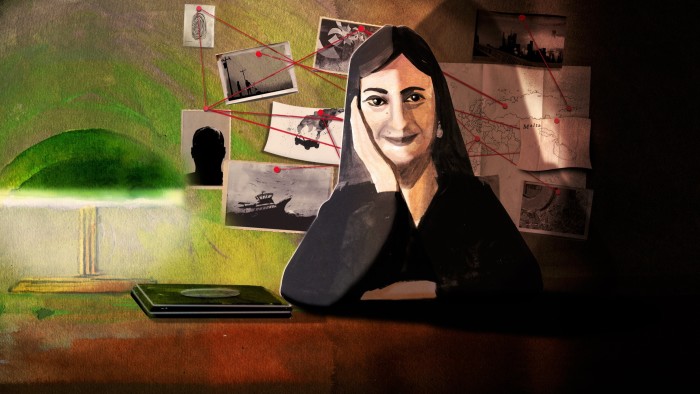Unlock the Editor’s Digest for free
Roula Khalaf, Editor of the FT, selects her favourite stories in this weekly newsletter.
After hearing a jury convict two men for supplying the bomb that killed my mother, I told my father how anxious I’d felt while waiting for the verdict. “Yes,” he said. “You looked green.”
My family and I had written two statements during deliberations: one welcoming a guilty verdict, another expressing dismay at an acquittal. But in both, we said what we have said since she was murdered on 16 October 2017 — the failures in Malta’s institutions which allowed this to happen remain unaddressed and unreformed.
The two men — Robert Agius and Jamie Vella — were found guilty. On Tuesday, the judge sentenced them to whole-life prison terms. They join the three hitmen already convicted. One middleman received a pardon in exchange for his testimony. One jury trial remains: that of Yorgen Fenech, the businessman accused of commissioning the murder. It has taken nearly eight years to get here.
The bomb was packed into a steel container, placed beneath my mother’s car seat, and detonated remotely just down the road from our home in Bidnija. It contained around 300 grammes of military-grade explosive. I didn’t know the weight until this trial. But I already knew what it destroyed.
My eldest brother, Matthew, was one of the first to reach the scene. He ran out of the house barefoot and found the flaming wreckage surrounded by my mother’s remains. She had been driving to the bank, just before three in the afternoon. She wasn’t killed instantly. A nearby farmer heard her scream before the blast hurled her car into a field and set it on fire.
My mother, Daphne Caruana Galizia, was Malta’s most prominent journalist, exposing corruption at the highest levels of government and business. In 2016, she revealed that two senior officials — Konrad Mizzi and Keith Schembri — in Prime Minister Joseph Muscat’s government owned secret Panama companies. The story set off protests, but not accountability. Instead, my mother became a target. She was sued for libel — 48 times at the time of her death — mostly by party officials or their financial backers. Five of those suits were criminal.
She was also placed under tax investigation. A café where she sometimes worked was raided by armed police. Her friends and magazine business were targeted. A campaign to discredit and dehumanise her was orchestrated from Muscat’s office.
Since her death, Malta’s political class has tried to frame justice in narrow terms — as the successful prosecution of a few men. But this isn’t only about five criminals and the businessman who allegedly commissioned them. Journalists who took up my mother’s work found that a shell company she identified in 2017 belonged to Fenech — and was set to make large payments, for the award of an energy sector contract, to the two Panama companies owned by Muscat’s energy minister Mizzi and chief of staff Schembri.
The bombmakers and hitmen were paid by someone to do a job. One later said that had he known who my mother was, he would have asked for €10mn, not €150,000. What made her murder possible was the system behind them. A public inquiry reported in 2021 that the state had created a culture of impunity and bore responsibility for her murder. The findings were devastating: corruption had spread from the prime minister’s office into the police, the anti-money laundering agency, the attorney-general’s office. The report described a “collapse of the rule of law” and made recommendations to restore it.
Most have not been implemented. Journalists in Malta still face harassment. The judiciary and police remain under-resourced. Corruption cases involving politicians stall. Those in power seem more focused on moving on than making changes.
My family has fought not just for justice, but for truth. We have lived with the reality that my mother was murdered for doing her job — and that the people who created the conditions for it still walk freely.
And yet, something remarkable endures. Her investigations are still cited in court. Her stories still circulate. She could not be silenced, even by death. But if Malta is ever to call itself a functioning democratic state again, it cannot rely on the courage of individuals to hold power to account. It must build systems that do what the one around her could not: protect the truth — and those who speak it.
There was something else I didn’t know before this trial. The two medics who conducted my mother’s autopsy said they found her heart was, incredibly, “intact” — and that it weighed 300 grammes. The same weight used to kill her was the weight of what endured.
